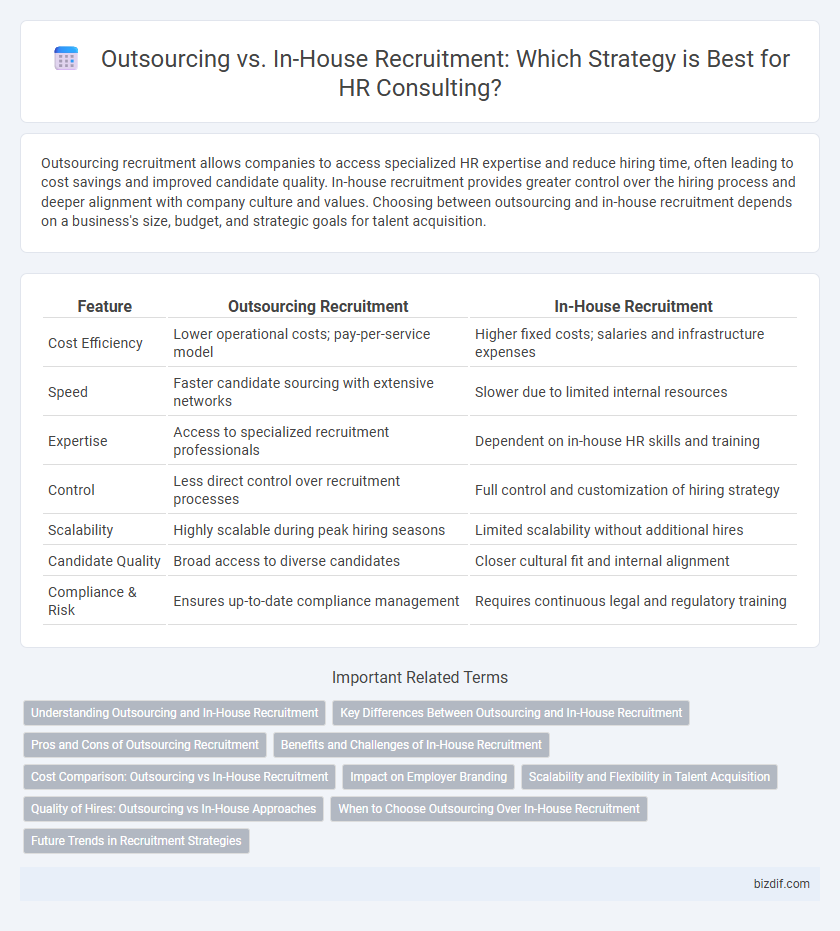Outsourcing recruitment allows companies to access specialized HR expertise and reduce hiring time, often leading to cost savings and improved candidate quality. In-house recruitment provides greater control over the hiring process and deeper alignment with company culture and values. Choosing between outsourcing and in-house recruitment depends on a business's size, budget, and strategic goals for talent acquisition.
Table of Comparison
| Feature | Outsourcing Recruitment | In-House Recruitment |
|---|---|---|
| Cost Efficiency | Lower operational costs; pay-per-service model | Higher fixed costs; salaries and infrastructure expenses |
| Speed | Faster candidate sourcing with extensive networks | Slower due to limited internal resources |
| Expertise | Access to specialized recruitment professionals | Dependent on in-house HR skills and training |
| Control | Less direct control over recruitment processes | Full control and customization of hiring strategy |
| Scalability | Highly scalable during peak hiring seasons | Limited scalability without additional hires |
| Candidate Quality | Broad access to diverse candidates | Closer cultural fit and internal alignment |
| Compliance & Risk | Ensures up-to-date compliance management | Requires continuous legal and regulatory training |
Understanding Outsourcing and In-House Recruitment
Outsourcing recruitment involves partnering with external agencies to manage the hiring process, offering access to specialized expertise and reducing internal workload. In-house recruitment relies on an internal HR team to handle candidate sourcing, screening, and onboarding, providing greater control and alignment with company culture. Understanding these approaches enables organizations to balance cost, efficiency, and talent quality in their hiring strategies.
Key Differences Between Outsourcing and In-House Recruitment
Outsourcing recruitment leverages external HR consultants to source talent, offering scalability and access to specialized expertise, while in-house recruitment relies on internal HR teams intimately familiar with company culture and long-term workforce needs. Cost structures differ significantly; outsourcing often involves variable fees tied to hiring volume, whereas in-house recruitment incurs fixed salaries and ongoing training expenses. Time-to-hire metrics tend to be faster with outsourcing due to dedicated recruiting resources, contrasted with potentially slower internal processes constrained by daily operational demands.
Pros and Cons of Outsourcing Recruitment
Outsourcing recruitment offers access to specialized expertise and a broader talent pool, reducing time-to-hire and operational costs. However, it may lead to less control over candidate quality and potential misalignment with company culture. Firms should weigh the efficiency and scalability benefits against possible risks of reduced internal insight and communication challenges.
Benefits and Challenges of In-House Recruitment
In-house recruitment offers direct control over hiring processes, enabling tailored candidate evaluation aligned with company culture and immediate feedback integration. However, it demands substantial investment in HR resources, training, and technology, which can limit scalability during peak hiring periods. The approach fosters deeper organizational knowledge but may face challenges in accessing diverse talent pools compared to specialized recruitment agencies.
Cost Comparison: Outsourcing vs In-House Recruitment
Outsourcing recruitment typically reduces costs by eliminating expenses related to full-time salaries, benefits, and recruitment technology, offering scalable solutions tailored to fluctuating hiring needs. In-house recruitment incurs fixed overheads including salaries for recruiters, training, software licenses, and infrastructure, which can increase overall spending during low hiring periods. Cost efficiency depends on company size, hiring volume, and recruitment complexity, with outsourcing proving more economical for firms with variable or high-volume staffing demands.
Impact on Employer Branding
Outsourcing recruitment enhances employer branding by leveraging specialized agencies that deliver a professional candidate experience and broader market reach, thus attracting top talent efficiently. In-house recruitment allows for a deeper alignment with company culture and values, fostering authentic brand representation during the hiring process. Balancing these approaches depends on organizational goals, with outsourcing boosting scalability and in-house efforts strengthening long-term employer brand identity.
Scalability and Flexibility in Talent Acquisition
Outsourcing recruitment offers unmatched scalability, allowing organizations to quickly adjust hiring volumes based on fluctuating business needs without investing in permanent resources. In-house recruitment provides greater control and alignment with company culture but often struggles with flexibility during sudden talent demands or market changes. Leveraging outsourced talent acquisition partners can accelerate hiring processes and access broader candidate pools while maintaining agility in dynamic workforce planning.
Quality of Hires: Outsourcing vs In-House Approaches
Outsourcing recruitment leverages specialized expertise and expansive networks, often resulting in higher-quality hires through refined candidate screening and assessment techniques. In-house recruitment allows deeper alignment with company culture and direct control over the hiring process, which can enhance candidate fit and retention. Balancing these approaches depends on organizational priorities, with outsourcing excelling in efficiency and scale, while in-house recruitment ensures tailored, strategic talent acquisition.
When to Choose Outsourcing Over In-House Recruitment
Outsourcing recruitment is ideal when companies need to scale hiring quickly or lack the internal resources and expertise to manage complex talent acquisition processes efficiently. It offers access to specialized recruitment technologies, broader candidate pools, and reduced time-to-hire, making it suitable for high-volume or niche roles. Organizations experiencing rapid growth or seeking cost-efficiency often benefit from outsourcing over maintaining a full in-house recruitment team.
Future Trends in Recruitment Strategies
Future recruitment strategies emphasize hybrid models combining outsourcing and in-house recruitment to leverage agility and internal culture alignment. Artificial intelligence and data analytics drive predictive hiring, enhancing candidate matching and reducing time-to-fill metrics. Companies increasingly prioritize diversity and inclusion analytics within recruitment technology to foster equitable talent acquisition and retention.
Outsourcing vs In-House Recruitment Infographic

 bizdif.com
bizdif.com